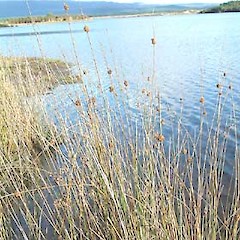Juncus australis
Common name
leafless rush, wiwi
Synonyms
Agathryon australe (Hook. f.) Záveská Drábková & Proćków
Family
Juncaceae
Flora category
Vascular – Native
Endemic taxon
No
Endemic genus
No
Endemic family
No
Structural class
Rushes & Allied Plants
NVS code
The National Vegetation Survey (NVS) Databank is a physical archive and electronic databank containing records of over 94,000 vegetation survey plots - including data from over 19,000 permanent plots. NVS maintains a standard set of species code abbreviations that correspond to standard scientific plant names from the Ngä Tipu o Aotearoa - New Zealand Plants database.
JUNAUS
Current conservation status
The conservation status of all known New Zealand vascular plant taxa at the rank of species and below were reassessed in 2017 using the New Zealand Threat Classification System (NZTCS) – more information about this can be found on the NZTCS website. This report includes a statistical summary and brief notes on changes since 2012 and replaces all previous NZTCS lists for vascular plants.
Please note, threat classifications are often suggested by authors when publications fall between NZTCS assessment periods – an interim threat classification status has not been assessed by the NZTCS panel.
- Conservation status of New Zealand indigenous vascular plants, 2017 . 2018. Peter J. de Lange, Jeremy R. Rolfe, John W. Barkla, Shannel P. Courtney, Paul D. Champion, Leon R. Perrie, Sarah M. Beadel, Kerry A. Ford, Ilse Breitwieser, Ines Schönberger, Rowan Hindmarsh-Walls, Peter B. Heenan and Kate Ladley. Department of Conservation. Source: NZTCS and licensed by DOC for reuse under the Creative Commons Attribution 4.0 International licence.
2017 | Not Threatened | Qualifiers: SO
Previous conservation statuses
2012 | Not Threatened
2009 | Not Threatened
2004 | Not Threatened
Distribution
.Indigenous. Kermadec, North, South Islands. Present on Norfolk Island and Australia
Habitat
Coastal to lower montane usually in damp pasture and swampy ground. Rarely within shrubland and open forest. Often on poorly drained clay soils. This species which flourishes in disturbed sites has probably increased its range following human settlement.
Wetland plant indicator status rating
Information derived from the revised national wetland plant list prepared to assist councils in delineating and monitoring wetlands (Clarkson et al., 2021 Manaaki Whenua – Landcare Research Contract Report LC3975 for Hawke’s Bay Regional Council). The national plant list categorises plants by the extent to which they are found in wetlands and not ‘drylands’. The indicator status ratings are OBL (obligate wetland), FACW (facultative wetland), FAC (facultative), FACU (facultative upland), and UPL (obligate upland). If you have suggestions for the Wetland Indicator Status Rating, please contact: [Enable JavaScript to view protected content]
FACW: Facultative Wetland
Usually is a hydrophyte but occasionally found in uplands (non-wetlands).
Detailed description
Broad, blue-green to grey-green loosely packed circular clumps, often with a few dead or live stems in the centre; occasionally not clump forming and with few stems. Rhizome 3–5 mm diameter, horizontal, just below soil surface (plants hard to pull out). Flowering stems 0.6–1.2 m tall, 1.5–4.0 mm diameter, hard, distinctly ridged, not shining, dull blue-green, glaucous to grey-green, pith interrupted, sometimes nearly absent, very rarely continuous. Leaves absent. Basal bracts numerous, very loosely sheathing chestnut-brown below grading through to straw-coloured in the uppermost bracts. Inflorescence apparently lateral, many-flowered, usually much branched, with flowers clustered at the ends of stout branchlet tips; sometimes condensed into a globose head > 15 mm diameter, with 1 or more, smaller, lateral clusters. Flowers 2.2–3.0 mm long, tepals pale green, later becoming light brown. Stamens 3(–4), rarely 3(–6). Capsule 2.3–3.0 mm long, equal or slightly > in length than tepals, ovoid to obovoid, obtuse, almost retuse at apex, pale greenish brown.
Similar taxa
The blue-green, glaucous to grey-green, ridged stems, and the usually interrupted to absent internal pith readily distinguish this species from other indigenous and exotic Juncus spp.
Flowering
September–December
Flower colours
Brown, Green
Fruiting
November–May
Life cycle
Mucilaginous seeds are dispersed by attachment, wind and water (Thorsen et al., 2009).
Propagation technique
Easily grown from fresh seed. Unlikely to prove a popular garden plant. Mostly regarded as a weed when it invades pasture.
Etymology
juncus: From the Latin jungere ‘to tie or bind’, the stems of some species being used to make cord (Johnson and Smith)
australis: Southern
Where To Buy
Occasionally sold by specialist native plant nurseries
Taxonomic notes
Proćków et al. (2023) proposed a taxonomic segregation of Juncus into six genera based on molecular and morphological evidence. Whilst it has long been recognised that the current circumscription of Juncus includes morphologically divergent taxa—reflected in the recognition of numerous subgenera and sections—the consensus view of the NZPCN website taxonomy subcommittee, taking into consideration advice from Australian Juncus expert Dr Karen Wilson (NSW Herbarium) and others in Europe is that the generic segregations proposed need further consideration and testing. Accordingly, it has been decided to maintain the current broad circumscription of Juncus, but to include all new names as synonyms in factsheets. We thank, in particular, Dr Wilson for her helpful comments.
Attribution
Fact Sheet prepared for NZPCN by P.J. de Lange (1 September 2006). Description based on Moore & Edgar (1970).
References and further reading
Johnson, A. T. and Smith, H. A. 1986. Plant Names Simplified: Their pronunciation, derivation and meaning. Landsman Bookshop Ltd, Buckenhill, UK.
Moore, L.B.; Edgar, E. 1970: Flora of New Zealand. Vol. I. Government Printer, Wellington.
Proćków, J., Záveská Drábková, L. 2023. A revision of the Juncaceae with delimitation of six new genera: nomenclatural changes in Juncus. Phytotaxa 622(1): 17–41.
Thorsen, M. J.; Dickinson, K. J. M.; Seddon, P. J. 2009. Seed dispersal systems in the New Zealand flora. Perspectives in Plant Ecology, Evolution and Systematics 11: 285-309
Mucilaginous seeds are dispersed by attachment, wind and water (Thorsen et al., 2009).
NZPCN Fact Sheet citation
Please cite as: de Lange, P.J. (Year at time of access): Juncus australis Fact Sheet (content continuously updated). New Zealand Plant Conservation Network. https://www.nzpcn.org.nz/flora/species/juncus-australis/ (Date website was queried)








